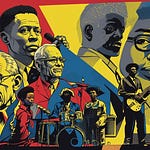The recent 25th BET Awards should have been a pure celebration—25 years of recognizing Black musical excellence deserved nothing less than reverence and joy. Instead, the ceremony became a stark reminder of the philosophical fault lines that continue to divide the African diaspora, particularly in how we honor our own.
The conspicuous absence of reggae legend Max Romeo from the In Memoriam tribute wasn't just an oversight—it was a symptom of something deeper. When you add Angie Stone's exclusion to the mix, both artists who were actively challenging Universal Music Group for unpaid royalties before their passing, the omission starts to feel less accidental and more institutional.
The Garvey-King Divide Lives On
What we're witnessing isn't new. It's the same ideological tension that has quietly shaped Black cultural politics for over a century. Marcus Garvey's equity philosophy—build your own, own your own, control your own—versus Martin Luther King Jr.'s equality vision—earn your rightful place at the existing table.
This divide has particular resonance in music industry spaces, where Caribbean artists often find themselves on the outside looking in, despite reggae's foundational influence on hip-hop, R&B, and contemporary Black music as a whole.
The irony cuts deep: while reggae rhythms pulse through countless Grammy-winning tracks, the genre's pioneers are frequently absent from the very ceremonies celebrating music they helped create.
Beyond the Ceremony: A Pattern of Exclusion
Max Romeo's absence from the BET tribute reflects a broader pattern. How many times have we seen reggae artists—whose music literally provided the blueprint for hip-hop's rhythmic foundation—relegated to footnotes in celebrations of Black music excellence?
This isn't about demanding participation trophies. This is about recognizing that the global Black experience extends far beyond America's borders, and that our collective strength lies in acknowledging these connections rather than compartmentalizing them.
The Gatekeeping Problem
The critique stings because it touches on uncomfortable truths about power dynamics within Black cultural institutions. When industry gatekeepers—many of whom are Black Americans—consistently overlook Caribbean and African contributions to the diaspora's musical landscape, it perpetuates the very exclusion that systemic racism has historically imposed on all of us.
As one observer noted with pointed irony: "The gate was guarded so tightly, not a single Jamaican, African, or Caribbean artist made it into the room with Diddy." The reference lands because it highlights how exclusion operates even within our own community spaces.
Moving Forward: From Apology to Action
The path beyond this moment requires more than acknowledgement—it demands structural change. Real solidarity means:
Expanding representation in music industry decision-making roles
Intentional inclusion in major Black music celebrations
Recognition of the global Black experience as central, not peripheral, to African American culture
Equity in ownership and platform-sharing, not just equality in access
The Bigger Picture
This controversy illuminates something crucial about diaspora unity: we cannot achieve collective power while practicing selective recognition. The same systems that have historically marginalized Black voices globally continue to operate when we fail to see each other's struggles as interconnected.
Max Romeo's "Chase the Devil" didn't just influence reggae—it helped birth hip-hop. His exclusion from remembrance ceremonies reflects a broader failure to acknowledge how Caribbean creativity has consistently enriched Black American culture.
Until we bridge the philosophical gap between equity and equality—until we create space for both self-determination and inclusive participation—we will continue to fragment the very unity that could also be our greatest strength.












Share this post